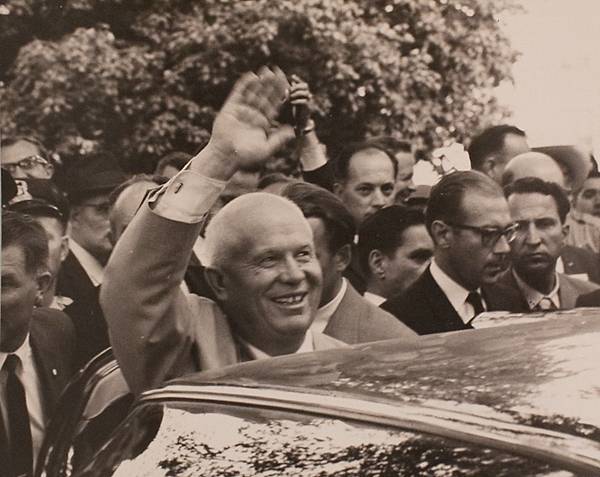Soviet leader’s visit to Iowa celebrated

August 25, 2009. Sushi by Panda Express.
August 26, 2009
On Sept. 23, 1959, General Secretary of the Communist Party of the Soviet Union, Nikita Khrushchev visited Iowa State University. Fifty years later, Iowa is hosting a Khrushchev in Iowa conference.
His visit, marked by protests and questions about his intentions, ran from Sept. 15–27 and took him on a tour including Hollywood, Iowa and Washington, D.C.
“I was very young, probably 12,” recalled John Davis, library assistant in the media department.
“My Dad took me out to the Des Moines airport to see him. I saw him through a chain link fence.”
Before coming to Iowa State, the Soviet Premier visited Des Moines and stayed in the Hotel Fort Des Moines on Sept. 22.
Associate Professor of Journalism and Communication Barbara Mack said she very clearly remembered his visit in Des Moines.
Mack said her parents also took her to see Khrushchev but instead of taking her to the airport, they took her to stand in front of the Hotel Fort Des Moines.
“My mom and dad took me downtown to wait for what seemed like hours to see his motorcade come through downtown Des Moines,” Mack said. “They had shown me what he looked like in newspaper photographs and pointed him out to me to wave and he waved to the crowd and I waved back to him.”
Khrushchev’s visit served a multitude of purposes, said Tom Klobucar, lecturer in the political science department. However, the Iowa portion of his trip was specifically targeted to developing the Soviet Union agriculturally.
“He came here and he was so impressed by Iowa’s corn production that he decided that the Soviet Union should turn itself into a leading corn producer; and he actually earned a nickname of ‘KuKuruznik,’ which means corn man,” Klobucar said.
Although the Cold War had not yet fully taken hold of the world, Khrushchev’s visit was not an entirely peaceful one.
A group called the “Committee for Freedom of All Peoples” formed in early September of 1959 in response to the visit. The committee requested permission from Ames police for protection while staging a demonstration against Khrushchev when he arrived, according to an issue of the Iowa State Daily published on Sept. 12, 1959.
Klobucar said Khrushchev’s visit was part of a peaceful coexistence that the U.S.S.R. and U.S. was attempting during the ’60s.
“There’s that old saying about keeping your friends close and your enemies closer,” Klobucar said. “I think these attempts at diplomatic contact between the Kennedy administration and Khrushchev’s were attempts to diffuse the nuclear situation.”
There was a growing fear of nuclear proliferation and eventual war, Klobucar said, and this visit served to reassure the American people by putting a personal face on a potential enemy.
Khrushchev’s interest in Iowa’s agriculture was one of several progressive ideologies that eventually got him kicked out of office, Klobucar said.
“Two things were happening at the time; the Western Countries were getting better and the Soviet Union was getting incrementally worse at producing Ag products,” he said. “This was because Stalin, in the ’ 30s, forcefully collectivized all of the farms in the Soviet Union and one of the things we learned by watching, and they learned by doing, was that collective farms simply do not produce as much as private ones.”
This attempt at reform for Russia’s agriculture system took a turn for the worse when droughts caused crop-shortage disasters. Khrushchev was eventually held responsible for these disasters.
“He wanted to develop the lands which they called the virgin lands, or the central plains, but the problem was that they were hit with a series of disasters. He was trying to grow corn in places that he couldn’t grow corn,” Klobucar said. “The visit to the United States, it did some positive things because it actually decreased some of the tension that was building between the two countries, but long term for him inside the Soviet Union it really contributed to his downfall.”
Mack said Khrushchev’s visit left an impression on her that was marred by the Cuban missile crisis of 1963.
“I clearly remember seeing this rotund, balding man get out of his car, smiling and waving to the crowd and being very affable. And it certainly came back to haunt me in October in 1963 and you thought, ‘My gosh how could that nice man who came to Iowa be thinking about launching a nuclear weapon,’” Mack recalled.
She said his visit wasn’t entirely friendly but people were excited to see him.
“There was this kind of caution if you will, this was a very cautionary approach. He was not welcomed here with open arms,” she said.
“There was suspicion, curiosity and fascination all woven together into a tapestry of public excitement.”
Schedule of Krushchev in Iowa
Thursday
Khrushchev author presentation
7–8:30 p.m.
Sheslow Auditorium, Drake University, 2507 University Ave., Des Moines
The Pulitzer Prize-winning author of “Khrushchev: The Man and His Era,” William Taubman, will give a presentation on the premier with commentary from Drake University President and Russianologist David Maxwell and Sergei Khrushchev, who was present on the 1959 visit.
The event is free.
Friday
Krushchev in Iowa Conference
1:30–5 p.m.
Hotel Fort Des Moines, 1000 Walnut St., Des Moines
Two simultaneous panels — Feeding a Hungry World and Citizen Diplomacy in U.S.-Russia Relations
$25 registration fee
Khrushchev in Iowa reception with cash bar
5:15–6:15 p.m.
Hotel Fort Des Moines, 1000 Walnut St., Des Moines
Saturday
Garst farm dedication at Whiterock Conservancy
9:45–11:00 a.m.
1390 Highway 141, Coon Rapids
Celebration of the entry of the Garst Farm into the National Register of Historic Places. Events will take place throughout the day, including live music, the play “Peace Through Corn” and a silage throw.






